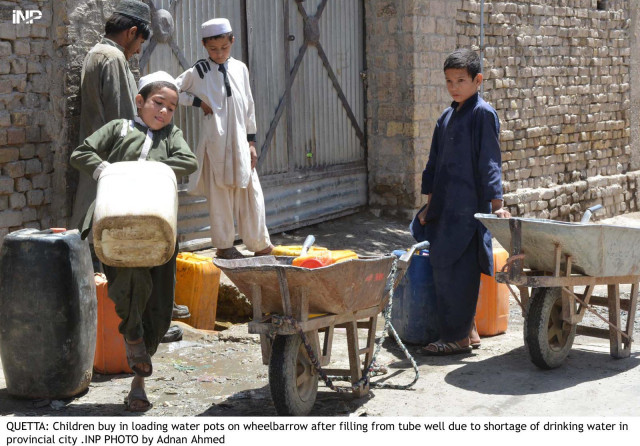HEC assures CM Kamal of redressing water scarcity
Chairman says VCs, heads of research centres to be mobilised

A boy uses his knee to lift a can filled with clean water in Quetta. PHOTO: INP
In a telephonic conversation, Dr Banuri felicitated Kamal on assuming the charge of chief minister of Balochistan and said that HEC was cognisant of the situation regarding the limited water resources in Balochistan, a press release said on Friday.
ADB approves $100m loan to address water shortages
He informed the chief minister that he was in contact with vice chancellors and heads of research centres in this regard.
He said that research in water resources was being conducted at a number of academic institutions, including Balochistan University of Information Technology, Engineering and Management Sciences, NED University, Mehran University of Engineering and Technology, University of Balochistan, and Pakistan Council of Research in Water Resources.
These researchers will be mobilised for conducting research, building capacity, and setting up monitoring and evaluation system to deal with problems related to ground water, water recharge, weather forecasting, climate change, and environmental changes.
PHE minister vows to resolve water crisis in Gwadar, Quetta and Kachi
Thanking the chairman, the chief minister appreciated the HEC for its offer of assistance in resolving the water shortage problem.
He said that the government, HEC and universities would work in close collaboration.
Water scarcity has been a serious problem facing different areas of Balochistan.
The national water resources are decreasing and the reservoirs are depleting with every passing year. The situation demands rigorous measures for conservation of water resources in the province.
According to reports, 62 per cent of the province lacks safe drinking water. Besides, over 50 per cent area has become uncultivable due to the shortage of water. The problem has caused a great setback to the agriculture sector. The situation is feared to lead to a serious drought in the coming years. Prompt measures are required to bring improvement to irrigation infrastructure and water resource management.



















COMMENTS
Comments are moderated and generally will be posted if they are on-topic and not abusive.
For more information, please see our Comments FAQ